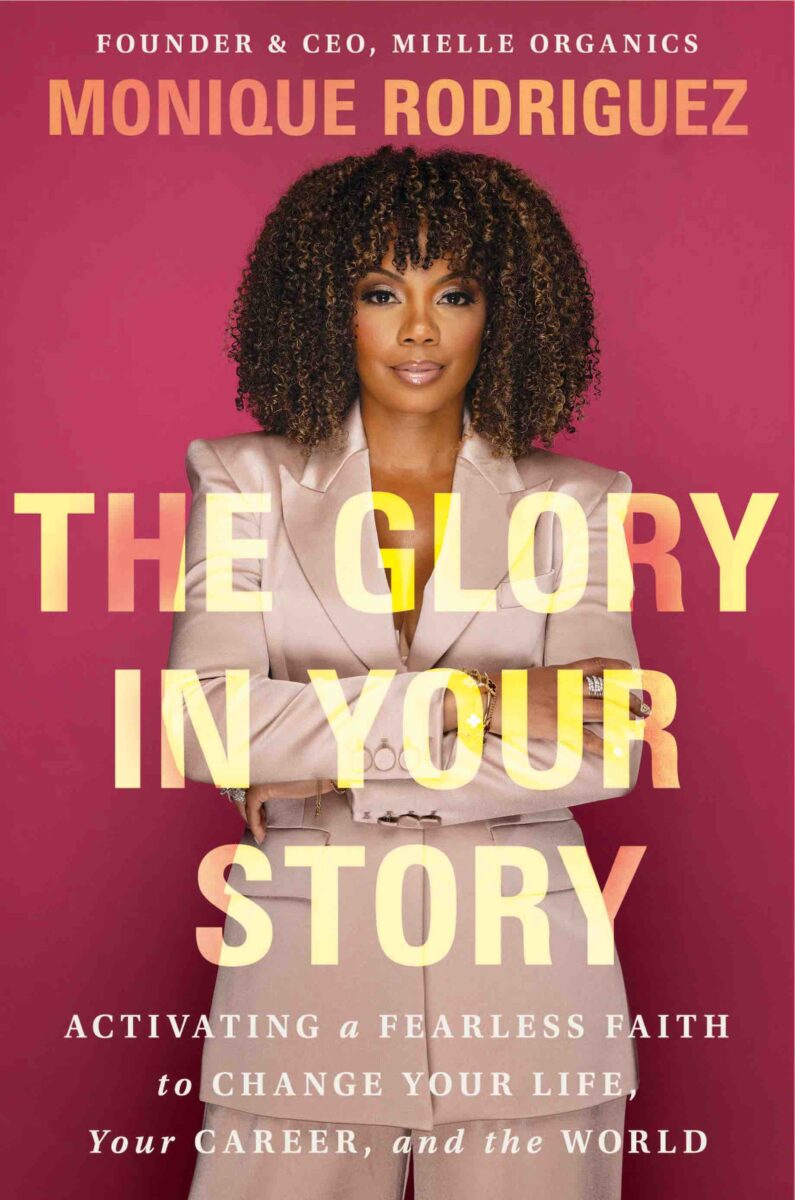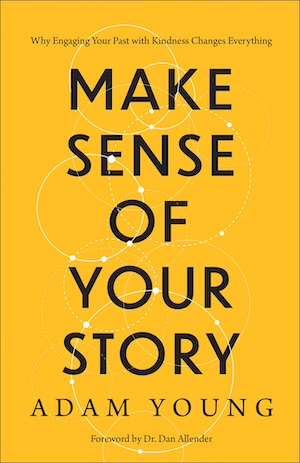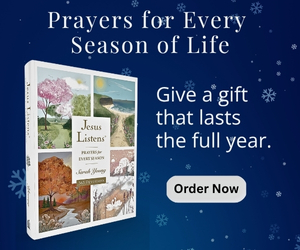Seeking Wholeness After Loss: Monique Rodriguez & Adam Young
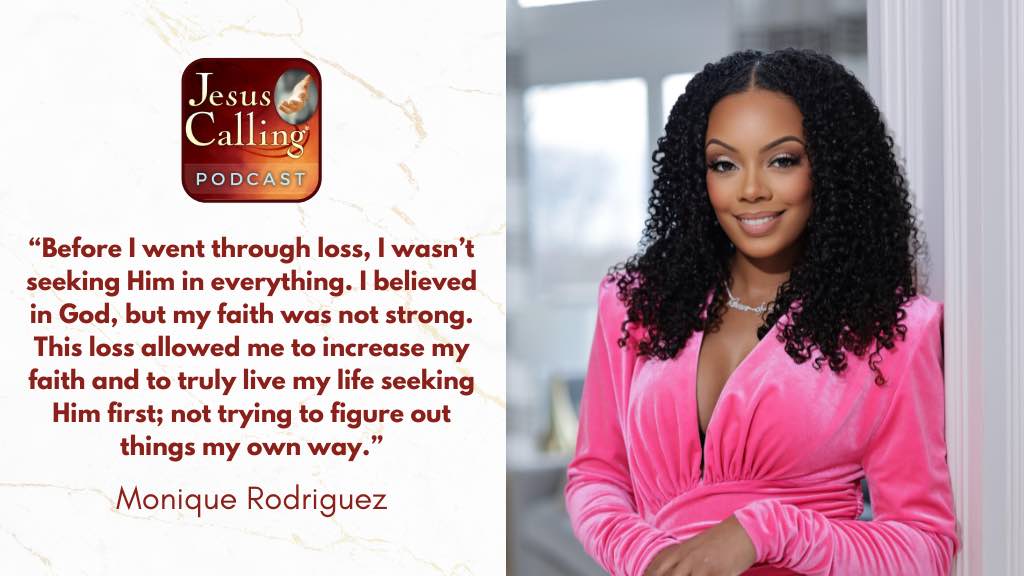
Monique Rodriguez: He tells us that all things will work together for the good and that there will be joy in the morning. I had to lean on His word and trust Him by faith that He was going to see me through this and to truly live my life seeking Him first—not trying to figure out things my own way.
Seeking Wholeness After Loss: Monique Rodriguez & Adam Young – Episode #479
Narrator: Welcome to the Jesus Calling Podcast. This week, we’ll hear from Monique Rodriguez—an author, entrepreneur, and founder of the women-led beauty brand Mielle Organics, a hair care and beauty brand. Monique shares how a devastating personal loss became the catalyst for a deepened faith and the birth of a global beauty brand built on bold belief, healing, and hope in God’s promises.
Later in the episode, we’ll hear from Adam Young, a therapist and podcaster from Fort Collins, Colorado. Adam is the voice behind The Place We Find Ourselves, where he guides listeners through the intersections of personal story, trauma, and healing. In his work, Adam highlights the power of relationships, the wisdom of the body, and the role of faith in helping us find meaning and connection.
Let’s begin with Monique’s story.
Monique Rodriguez: My name is Monique Rodriguez, and I am the founder and CEO of the number one fastest growing textured haircare brand, Mielle Organics, which I started in my kitchen eleven years ago. We have become a global sensation. We are in over a hundred thousand retail stores across the United States, and we’re also global. Our mission is to serve, empower, excite, and educate our consumers on having healthy hair and being excited about embracing their natural beauty.
Living For Someone Else’s Dream
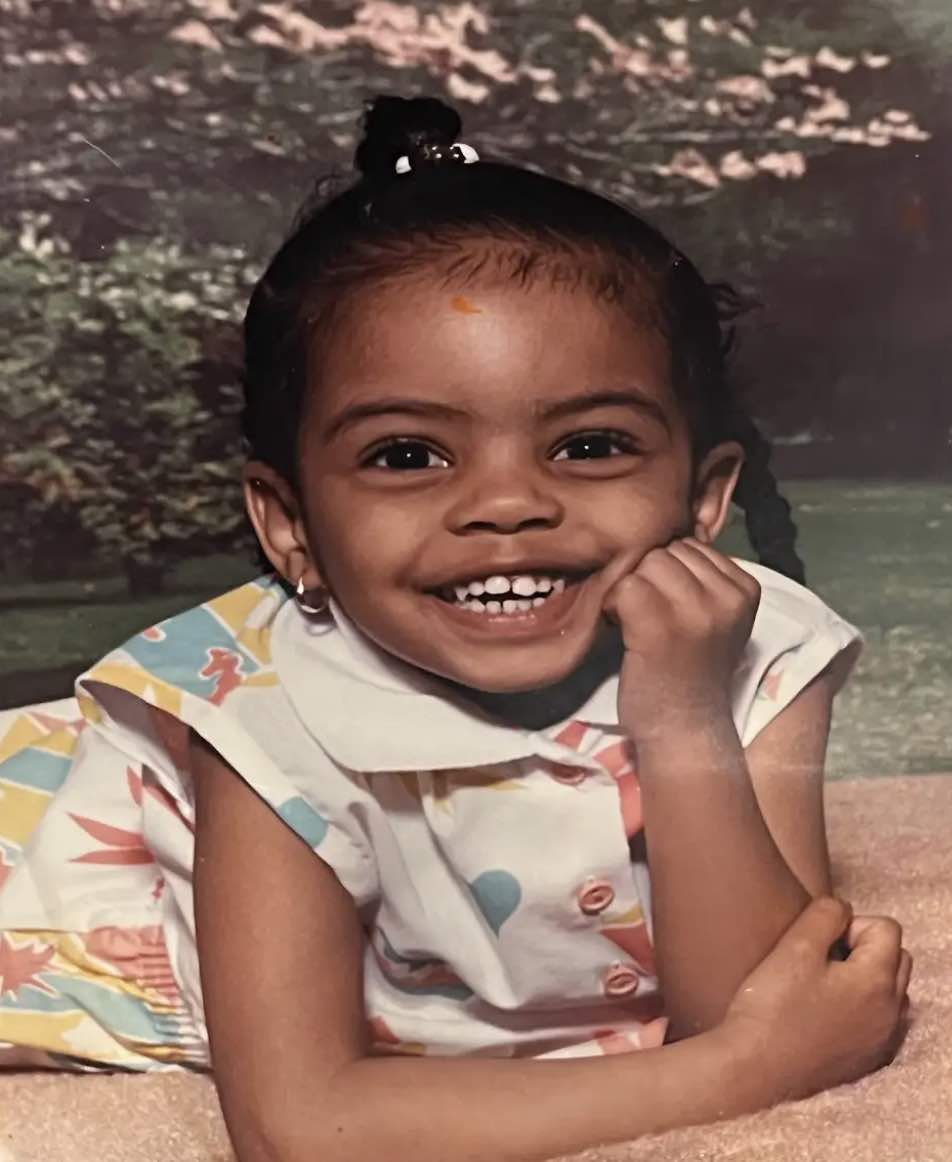
When I was younger, my dreams and aspirations were to be in the beauty space or entertainment. I would go to different hair auditions to model for different hair care companies. I entered myself into beauty pageants growing up, and I would literally beg my mom to take me to different model calls so I could get cast. My mom thought that it was a cute thing to do, but it wasn’t realistic for her.
She would take me to these model calls, and she would quickly tell me that, “This is cute, but this is not sustainable. You need to find a stable career.” She always preached to me to go into the medical field because it was recession proof. And for my mom, it was all about survival. It wasn’t pursued when I was younger to follow your dreams or your passions. It was more so about, This is what I need to teach you to do to survive so you can leave my house and pay your bills when you are an adult. And so I did what was safe and comfortable and became a nurse.
It was my mom’s dream for me. But I realized once I started my career working as a nurse, I wasn’t fulfilled, and I wasn’t happy in that career path. I told myself at a young age that this was not something that I wanted to do for the rest of my life and that I would find a way out. I just didn’t have the courage and the faith in myself to believe that I could actually achieve what was deemed impossible for someone that looked like me growing up in the household that I grew up in.
“I just didn’t have the courage and the faith in myself to believe that I could actually achieve what was deemed impossible for someone that looked like me growing up in the household that I grew up in.” – Monique Rodriguez
A Devastating Loss that Changed Everything
It wasn’t until 2013, when I went through a tragic loss of my son that forced me to look at life from a different perspective. I was eight months pregnant. It was our first boy, and we were very ecstatic and happy and joyful that we were bringing our son into the world. I knew that I was a high-risk pregnancy because my previous child, my second daughter, Mackenzie, was high risk. She was born early, and I had to have an emergency C-section with her. Because of that emergency C-section, my uterus was cut vertically instead of horizontally, which is a normal routine C-section on the uterus. I remember the doctor told me when I had her that any subsequent pregnancies that came after that, I was at risk for having a uterine rupture. I didn’t think that it would happen, but I knew that the risk was there. When I turned eight months, I started contracting, and sure enough, I did have a uterine rupture. My husband rushed me to the hospital, and unfortunately, once we got to the hospital, there was no doctor on call because it was not a high-risk hospital. By the time the doctor did arrive, it was pretty much too late.
By the time he was able to do the C-section to take my son out, my son was born with no brain activity because he had lost so much oxygen to the brain. Unfortunately, he had succumbed to his injuries. It was just a very devastating loss to my family, and I really didn’t know where to turn.
Questioning God Through Our Worsts Moments
I went through the grieving process of asking myself, “Why me? Why did this happen to me? I did everything that I thought I was supposed to do.” And then I went through the guilt of feeling like, Could I have done something differently? Then, I had to turn my narrative and say, “Well, God, what are you trying to show me from this? There is a purpose behind this, I just don’t know what it is.”
He tells us that all things will work together for the good [Romans 8:28] and that there will be joy in the morning [Psalm 30:1-5]. I had to lean on His Word and trust Him by faith that He was going to see me through this with an even bigger promise on the other side of this. I felt that God was telling me, number one, “In order to live this life, I have to have a relationship with you.”
“I had to lean on His Word and trust Him by faith that He was going to see me through this with an even bigger promise on the other side of this.” – Monique Rodriguez
Before I went through my loss, I wasn’t seeking Him in everything. Obviously, I believed in God, and I knew there was a God, but my faith was not strong. This allowed me to increase my faith and to truly live my life by seeking Him first and not trying to figure out things my own way.
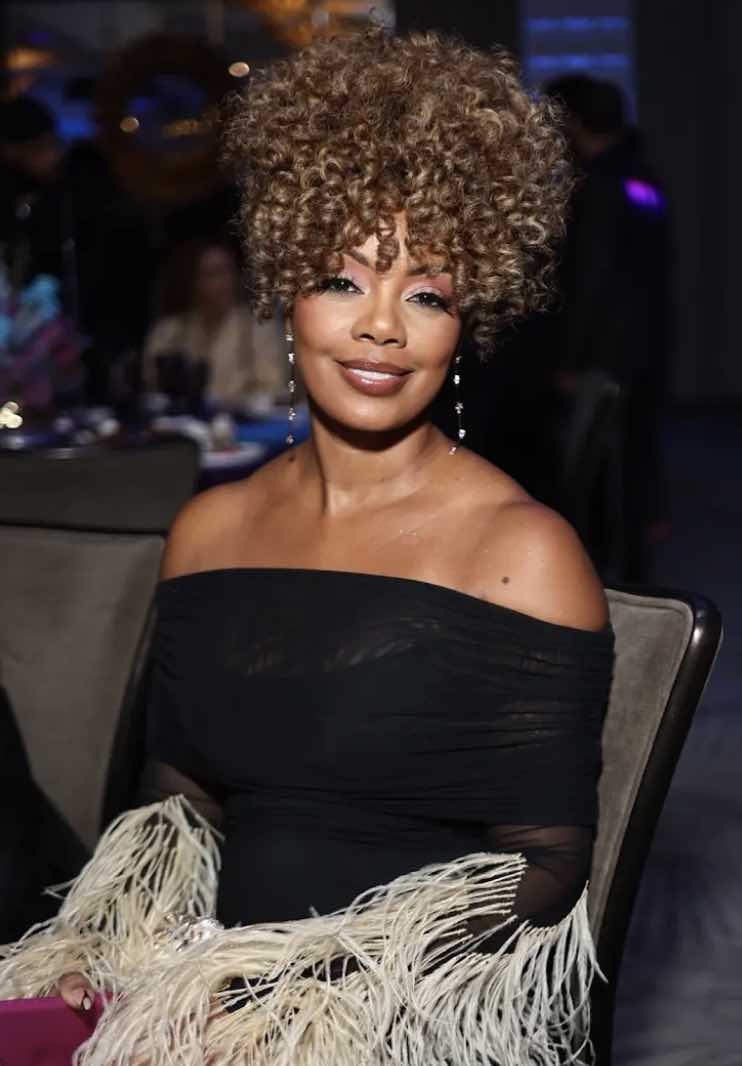
I decided that I wanted to follow His lead, and I wanted to live a purpose-filled life because you only get one shot at life. When you go through tragic events, it really causes you to have a different perspective on life. I no longer wanted to live my life for my mom’s dreams and what she wanted for me. I wanted to just step out and just take the chance and trust God to order my steps because this was a dream and a passion that He put in me when I was a little girl.
“I decided that I wanted to follow His lead, and I wanted to live a purpose-filled life because you only get one shot at life. When you go through tragic events, it really causes you to have a different perspective on life.” – Monique Rodriguez
I decided to fulfill it when I went through that loss, and I am thankful for my son’s life because he caused me to have a relationship with God. He taught me to be fearless and to have courage and to be bold in my faith, and that’s how Mielle Organics was created.
“I decided to fulfill [my dream] when I went through that loss, and I am thankful for my son’s life because he caused me to have a relationship with God. He taught me to be fearless and to have courage and to be bold in my faith.” – Monique Rodriguez
When Business Becomes Ministry
To me, Mielle is more than a business. I like to call it “marketplace ministry” because I feel that Mielle was the vessel and the vehicle that God used to increase my platform so I can ultimately glorify Him and share my testimony with inspiring others and bringing people to God’s Kingdom. I want people to look at me and say, “If God did it for me, then He can definitely do it for them.”
Our mission is not only to empower, educate, and to excite women about healthy hair, but I also feel that we are empowering, exciting, and educating about the gospel. I like to say that I’m giving people the opportunities to know Jesus and to know about God and our Lord and Savior by doing it in a fun way—having conversation that’s not forceful, that’s talking about haircare.
“Our mission is not only to empower, educate, and to excite women about healthy hair, but I also feel that we are empowering, exciting, and educating about the gospel.” – Monique Rodriguez
I really want people to see me as a representative of God’s Kingdom, and to say, “Because of her, I now know Jesus.” And, “Because of her, I’m now reading scriptures and the Bible.” I was at one point holding a live prayer every Monday morning at six a.m. with nothing that I wanted in return. It’s not normal to see a CEO that’s so vocal about faith. And not only a CEO that is vocal about faith, but that’s coming on live and having a prayer gathering. I just wanted to make it a safe space where people can say that they experienced Jesus because they came in contact with Mielle. So, I do feel that Mielle—because it was birthed from a place of pain that ultimately was purposeful—is anointed. [I want] anyone that comes in contact with the brand or myself to experience my faith in Jesus Christ.
“I do feel that Mielle—because it was birthed from a place of pain that ultimately was purposeful—is anointed.” – Monique Rodriguez
Finding Strength in Faith Amid The Pressures of Leadership
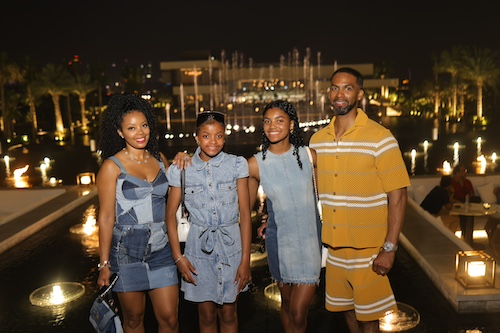
There are many stressful days working as a CEO. There are many demands on my life with being pulled in many different directions. There is a lot of responsibility that falls on my shoulders, and at times that burden can be a lot to bear. Staying rooted in the Word and also journaling is very helpful for me because it also allows me to release my thoughts—to do a brain dump. It also allows me to have deep, intimate conversations with God.
I have to just lean on my prayer life, my faith, and reading God’s Word because [there’s] one thing that I know is true and that’s His Word. Everything else in this world are worldly things, and those things are not sustainable. They will diminish. The one thing that is sustainable is leaning on my faith in God’s Word, and that’s what continues to carry me through.
This is titled Jesus Listens and it’s from March 20th:
Creator-God,
Your Word tells me that You make my feet like the feet of a deer and enable me to stand on the heights. You created deer with the ability to climb steep mountains effortlessly and to stand fearlessly on the heights. You also created me, and You redeemed me—making it possible for me to “stay on my feet” by trusting You. This gives me confidence to walk and make progress upon my high places of trouble, responsibility, and suffering.
It’s crucial for me to remember that I live in a world where my spiritual enemies never declare a truce. Help me to stay alert and be ready for battle at all times—putting on the full armor You provide. No matter what happens, I want to be able to stand my ground, and after I have done everything, to stand. Whenever I’m in the thick of battle, please remind me to assert my trust in You—my confidence that You are with me, fighting alongside me. Even when I feel as if I’m losing the battle, I know I must not give up. My assignment is to hold tightly to Your hand and just keep standing. This is victory!
In Your victorious Name, Jesus,
Amen
Narrator: To learn more about Monique Rodriguez and her work, visit www.mielleorganics.com, and be sure to check out her new book, The Glory in Your Story: Activating a Fearless Faith to Change Your Life, Your Career, and the World, at your favorite retailer.
Stay tuned to Adam Young’s story after a brief message.
JESUS CALLING: STORIES OF FAITH Returns for Season 4!
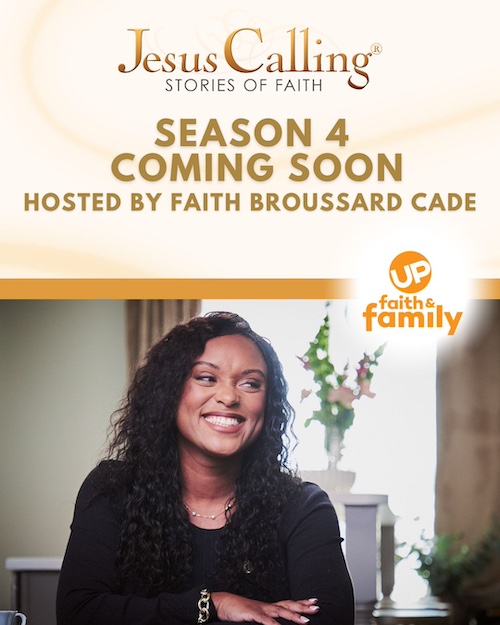
Hey everyone, this is Faith Broussard Cade, your host for the fourth season of Jesus Calling: Stories of Faith on UPTV. We’re so excited to bring you inspiring stories of people from all walks of life, who have turned to their faith in times of struggle, and in times of joy. We’re going to hear from some extraordinary guests this season, including Julie Chen Moonves, who you might know as the host of Big Brother. We’ll also be joined by NFL Hall of Famer Terry Bradshaw and Light Heavyweight Champion boxer Andre Ward, GRAMMY award winning gospel singer BeBe Winans, the world renowned Italian tenor Andrea Bocelli, and actress Taraji P. Henson, in addition to many others. And of course, you’ll get to hear more about me and my story, too. I can’t wait to see you there. Stay tuned for the new season coming soon on UPTV!
Our next guest is Adam Young, a trauma therapist based in Fort Collins, Colorado, and the host of The Place We Find Ourselves podcast. Adam helps people explore the impact of their past, uncover hidden emotions, and move toward healing.
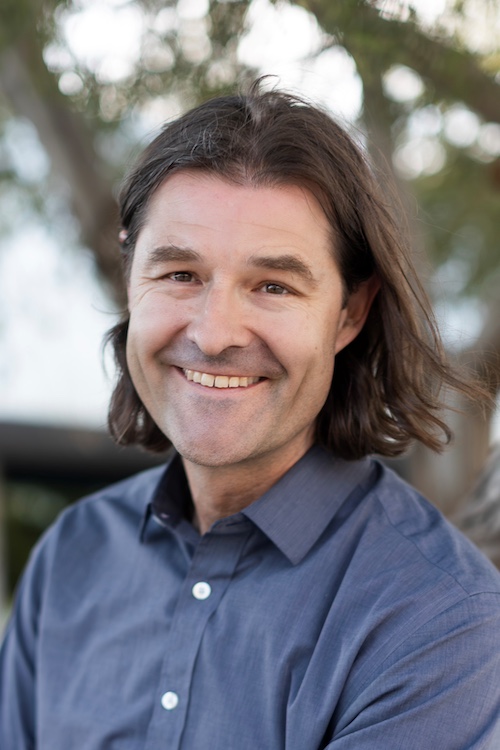
Adam Young: My name is Adam Young. I am a trauma therapist in Fort Collins, Colorado, and I’m also a podcaster. I’m the host of The Place We Find Ourselves podcast. This year I’m a new author. I’m the author of a book called Make Sense of Your Story. I split my time between doing therapeutic work with people and speaking at conferences and podcasting.
Facing the Reality of Your Trauma
The body never lies. It always tells the truth. We don’t know necessarily what truth it is telling in the moment, but if you’re having butterflies in your stomach, if you have a lump in your throat, if you have tightness in your chest because of a certain experience that you’re having or something coming up in your life, that is your body’s way of saying, “There is something inside your heart that needs to be addressed that is not well.” It doesn’t mean you’re doing anything wrong. It means that your body is needing you to tend to the sensations that it is experiencing. And sensations are always also emotions. So those butterflies in the stomach—that might be anxiety, it might be panic, it might be terror. But what if you were curious? That’s the keyword. And here’s the second keyword—what if you were kind as you explored those uncomfortable sensations in your body instead of saying, “I shouldn’t be feeling this.”
“If you’re having butterflies in your stomach, if you have a lump in your throat, if you have tightness in your chest because of a certain experience that you’re having or something coming up in your life, that is your body’s way of saying, ‘There is something inside your heart that needs to be addressed that is not well.’” – Adam Young
It is just normal, understandable, and reasonable for you to know internally in your body that, If I open up this box, if I look underneath that particular story, I am going to start to feel some feelings that are overwhelming. And those feelings may be sorrow and grief. Those feelings may be shame, those feelings may be fear, panic, rage. But we all have unfelt feelings trapped inside of us. Why? Because when we were boys and girls, when we were younger, for many of us, there was no space in our home to feel our feelings at the time, and as a result, you have fear inside your body that has not yet been felt. You have anger that has not yet been experienced and expressed. Part of the healing journey is getting honest, not just about what happened, but about the feelings that you have in your body, and welcoming those, making us a home for those feelings so that they can be felt, processed, and expressed.
“Part of the healing journey is getting honest, not just about what happened, but about the feelings that you have in your body, and welcoming those, making us a home for those feelings so that they can be felt, processed, and expressed.” – Adam Young
We all have defensive structures. I mean, that’s just what it means to be human. By defensive structures, I mean we have blind spots and we have aspects of our life that we are consciously and wittingly ignoring. We have areas of our lives that we’re unwittingly ignoring. Both are true. When someone else is given access to my heart and my story—and hopefully that’s somebody that has training and has engaged their own story meaningfully and well—you are giving that person, in a sense, editorial privilege over your life. You’re giving that person the sacred role of speaking into your story. And when they do that, it will expose some of your defensive structures—some of the places that you are closing your eyes to the truth of what really went down for you as a boy or a girl in your family.
We can’t see our own story well without the assistance of others. Why? Because it was just normal for us. So whatever you experienced in your home growing up, that was normal for you, no matter what it was. Therefore, you’re not going to turn thirty-five years old, and say for example, “I experienced trauma growing up.” You need other people to help you see the reality of the harm that you experienced growing up. And not everyone has trauma, but everyone has experienced harm from their family of origin during their growing up years, and therefore, their brain has been deeply affected by that harm. So to heal that harm, there needs to be a look at those past stories during your growing up years, with the assistance of other people.
Healing Through Relationships
The primary thing that causes neural networks to heal is relationships. We are fundamentally relational creatures at our core, being created in the image of a triune God—a “we” and not an “I.” To be in relationship is just core to what it means to be human. So whenever you experience trauma, and with that trauma the disruption of healthy neural wiring in your brain, the single most effective way to experience healing of those neural networks is through healthy relationships with other people. But what does that mean? At a bare minimum, it means you need to engage your personal story in your family of origin with the help of other people who are bearing witness to that story, asking you questions about that story, and speaking into that story. So healing is necessarily relational, and it requires looking at the past. Those are the two key attributes, I’d say, that lead to the healing of neural networks.
“Whenever you experience trauma, the single most effective way to experience healing of those neural networks is through healthy relationships with other people. Healing is necessarily relational, and it requires looking at the past.” – Adam Young
To be in relationship with God is a fraught endeavor. Why? Because all of us had fathers and mothers growing up, or we had primary caretakers who were in the role of father and mother, and those people failed us. There is no one on the planet that doesn’t have issues with regard to God because all of us had an experience of an adult that we extrapolated to God. That’s just normal. We were harmed by that person. Some of that harm was intentional, some of it was unintentional, but we hold that harm and the memory of it in our bodies.
And therefore, when we turn to God in prayer, we bring all of our story with us, and that makes relating to God a very difficult experience for many, many people. Some people feel like God is there one minute and gone the next, or there one day and absent the next. And just that ambivalence—the feeling [of being] close to God one day, and then the next day, I don’t feel close to God. Just that experience alone is deeply disruptive to us because we’re created for consistency and for what neuroscientists call attachment. We’re created for secure attachment, which means a healthy relationship with God where we have a felt sense that God is there for us, that God will respond to our cries, and that God is pursuing our hearts. That’s what secure attachment looks like. But sadly, many of us did not grow up with secure attachment because of the harm we experienced, and therefore, when it comes to relating to God, we bring with us all sorts of filters and assumptions and past experiences that play out in how we experience God. And that can be really, really, disruptive and provoking for us.
“We’re created for secure attachment, which means a healthy relationship with God where we have a felt sense that God is there for us, that God will respond to our cries, and that God is pursuing our hearts.” – Adam Young
I think everyone needs to know how they best connect with God, and that’s different for different people. Some people connect much more meaningfully and quickly with God when they are in nature, and that’s because nature displays in so many ways the glory of God and the substance of God and the presence of God—flowing water and majestic mountain ranges.
Now other people, and people in different seasons of their life, are in so much internal torment and agony because of difficult experiences that they’re having that they are simply on the floor with God. They cannot get up, and this is a very biblical and human experience. It doesn’t last forever, but it happens for many people at some point or points in their life where they are flat out prostrate on the floor. At some level they don’t have words, they just have cries. They just have agony coming out of their mouth, which may find words, but often does not. When we’re in those seasons, we are in deep need of the comfort of God, the witness of God to our suffering, and the comfort of God. For many people, they experience that alone instead of with others. But when we’re in that level of suffering, that’s when we most need God, and that’s also when we most need other people to comfort us.
Prayer, Mindfulness, and Solitude Bring Us Back to Our Heart
Practices in general, whether it’s prayer, mindfulness, walking and looking at beauty, whatever practices you have in your life where you bring the fullness of your presence—and that’s the key attribute for a practice to be meaningful—you have to be aware and present. So if you are just praying and you’re going through the motions and you are not actually emotionally present, I don’t think prayer is very meaningful or helpful. However, if you can bring your whole heart, if you bring all of your feelings, if you could bring whatever is going on for you, your presence, to the practice of prayer, then the repeated experience of that literally builds neural networks in our brain. That’s what practices do. Repetition creates not just new neural networks, but deepening neural networks in our brain. It adds myelin to the neurons in our brains, and myelin is very good for our brains. As a result, the more you engage in practices with intentionality and presence, the healthier your brain becomes.
“Practices in general, whether it’s prayer, mindfulness, walking and looking at beauty, whatever practices you have in your life where you bring the fullness of your presence—and that’s the key attribute for a practice to be meaningful—you have to be aware and present.” – Adam Young
There’s the practice of solitude. Especially for those of us in the west, being with yourself in the quiet, in the silence, is a very hard practice to engage in. We are so inundated with noise and information that practicing solitude is not common. It is countercultural, and I think it is a deeply Biblical practice that we’ve lost. So the practice of prayer, the practice of solitude, both are necessary for the development of not just your brain, but for you to come to know who you are, who God created you to be, and how you uniquely reflect God in a way that others don’t. You can’t come to those realizations except with some measure of silence and solitude, being with your own heart.
“The practice of prayer, the practice of solitude, both are necessary for the development of not just your brain, but for you to come to know who you are, who God created you to be, and how you uniquely reflect God in a way that others don’t.” – Adam Young
Solitude doesn’t mean you’re inside with absolutely no external input of sound. Solitude means that you are being with yourself—whether you’re out in nature, whether you are floating down a river, whether you’re looking at a mountain, hiking on a trail. The question is are you bringing your attention to the hidden places and the deep desires of your own heart or are you daydreaming? Many of us daydream. The issue with solitude is about focusing your attention on your deep desires and what’s going on inside your own heart, and you can do that anywhere.
The good thing about devotionals is number one, it becomes habitual. So very often when you do a practice like reading a devotional, if you do it for two or three weeks in a row, you develop a habit. You have a certain place in your home, and you have a time of the day typically where you will devote yourself and bring your attention to this particular devotional. When you’re doing that, you are focusing your attention and your heart on God, and that is a very, very, helpful practice to do on a regular basis.
This is from the devotional Jesus Listens, January 10th:
Dear Jesus,
Please help me learn to appreciate difficult days—being stimulated by the challenges I encounter rather than becoming distressed. As I journey through rough terrain with You, I gain confidence from knowing that together we can handle anything.
When I look back on my life, I can see how much You have helped me through difficult days in the past. Yet I easily fall into the trap of thinking, “Yes, but that was then, and this is now.” Instead, I need to remember that though my circumstances change immensely, You remain the same throughout time an eternity. Moreover, in You I live and move and have my being. As I live close to You—aware of Your loving Presence—I can go confidently through my toughest times.
In Your worthy Name,
Amen
Narrator: To learn more about Adam Young, you may visit www.adamyoungcounseling.com, and please be sure to check out his new book, Make Sense of Your Story: Why Engaging Your Past with Kindness Changes Everything, at your favorite retailer.
If you’d like to hear more stories about the path to wholeness, check out our interview with Tabitha Brown.
Next week: Drs. Michael Sherr, Angelia Mickle, and Jason Lee
Next time on the Jesus Calling Podcast, we’ll hear from Drs. Michael Sherr, Angelia Mickle, and Jason Lee, who have brought together their experience in social work, theology, and nursing to help equip healthcare professionals bridge the gap between their faith and their calling.
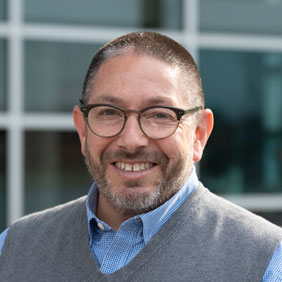
Dr. Michael Sherr: We want Christians who feel called to be on the front lines to make it and be successful throughout their whole career—the 10,000 days or the forty years that they probably will be working in health care.
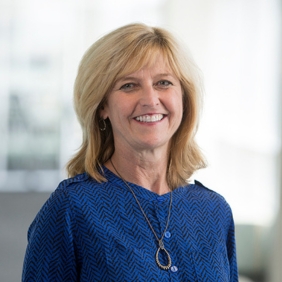
Angelia Mickle: The reality is that we live in a broken, fallen world, and we are servants of common grace, and we’re here to point people to Jesus Christ.
